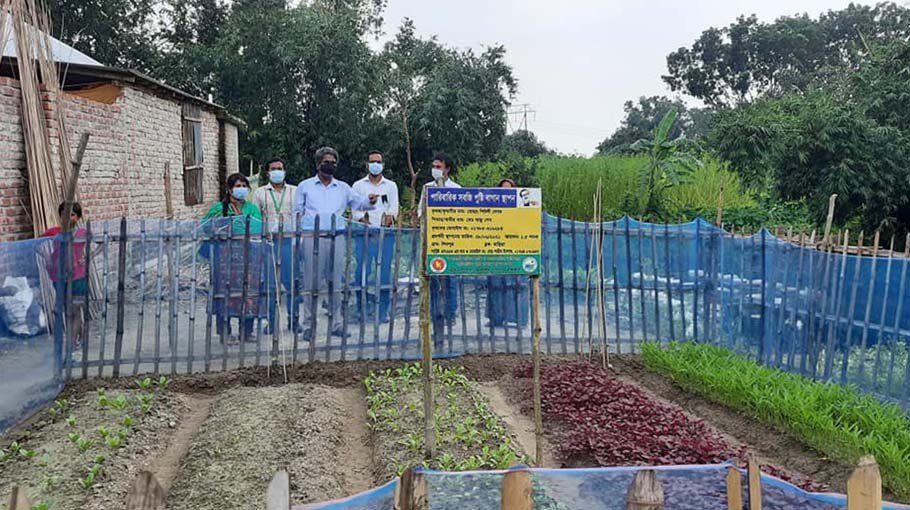Homestead gardening boosts rural economy in Rajshahi

Homestead gardening contributes to accelerating the rural economy with meeting protein demands in the region, inspiring people to cultivate vegetables on the fallow land near their abodes.
Many people are seen cultivating vegetables, spices and fruits on homestead and other bare lands round the year and changing their fortunes.
“I have set up a vegetable and fruit garden on around two decimals of fallen land around my home and get fruits and vegetables all the year,” said Muhammad Shahabuddin, a resident of Palpur village under Godagari Upazila.
After meeting the family demands, he has sold vegetables and fruits, including papaya, banana, kulboroi (plum), kamranga (star fruit), dalim (pomegranate) , bean, bottle gourd, tomato, radish, red amaranth, spinach, batishak, cabbage, garden pea, bush bean, brinjal, chili, onion and garlic and earned around Taka 8,000 during last one year.
Shahabuddin said the garden has become the main source of meeting their protein demands with earning.
Piarul Islam of Phulbari village has got the way of changing his fortune through homestead garden.
“We are very much happy over the encouraging yield of homestead gardening,” said Shaheda Begum, a farmer of Ishwaripur village, adding that it is helpful in improving the living and livelihood condition of the villagers.
Sub Assistant Agriculture Officer Atanu Sarker opined that homestead gardening fosters self-sufficiency of people. “We are working together to make the family gardening profitable and sustainable,” he added.
On behalf of the Department of Agricultural Extension (DAE), the farmers are being imparted training on vegetable farming.
Various inputs and other logistic supports, including seed, vermicompost and saplings of fruit trees, are being provided to the trained farmers for encouraging them in farming.
The DAE has been promoting homestead gardening under its project titled ‘Establishment of Family Nutrition Gardens in Uncultivated Fallen Lands and Backyards’ so that the farmers can recoup the losses caused by the Covid-19 pandemic.
Ultimate goal of the project is to contribute to the economic recovery and resilience of the villagers, including the marginalized communities badly affected by the adverse impact of the pandemic.
Jahangir Alam Khan, Project Coordinator of Integrated Water Resource Management (IWRM), told BSS that successful promotion of vegetable and fruit gardening is very important for lessening the gradually mounting pressure on underground water resources as those are less-water consuming crops.
So, the homestead gardening will contribute a lot towards elevating socio-economic conditions in the region through minimizing its water crisis situation as the venture will be an emergency response to the Covid-19 pandemic, he added.
Sirajul Islam, Additional Director of DAE, told BSS that the present government's priority is to ensure food security through bringing every inch of uncultivated fallen land and homestead under vegetable and fruit cultivation.
A total of 32 demonstration gardens of vegetables, fruits and spices will be set up on the unused land in each of the unions under the project.
Each of the farmers is also being brought under cash incentives worth Taka 1,935 in this regard. Apart from this, they are being given logistic support with seed, fertilizer and signboard.
Besides, interested people are being educated about the adverse effects of chemical fertilisers in crop field and also trained them to organically grow a wide variety of vegetables, spices and fruits in small spaces around their houses.
The project will increase food production as well as meet the people's need of vegetables and nutrition during the pandemic, Islam said.



